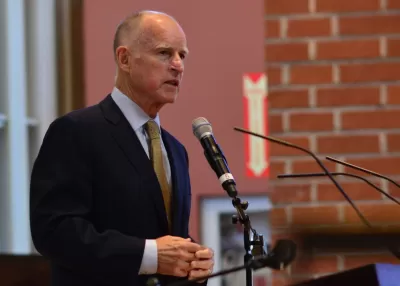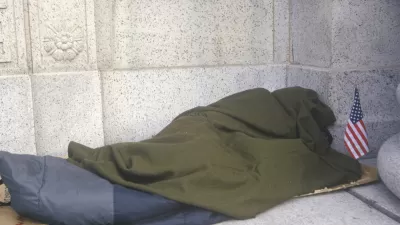Three bills at the top of the Democratic leadership's housing agenda will have little impact on the state's chronic housing shortage according to multiple analyses, and wouldn't affect the outcome of a Bay Area mega-development controversy.

"The three marquee measures under consideration — Senate Bills 2, 3 and 35 — aim to increase funding for low-income housing projects and ease development regulations," reports Liam Dillon, who covers California state politics and policy for the Los Angeles Times and is based in Sacramento.
The measures are unlikely to help spur enough home building in general. Development would still fall short by tens of thousands of new homes needed annually just to keep pace with projected population growth.
In July, Dillon reported on the four the parts of parts of a housing deal being advanced by Gov. Jerry Brown, Senate President Pro Tem Kevin de León (D-Los Angeles) and Assembly Speaker Anthony Rendon (D-Paramount), according to Assemblyman Rob Bonta (D-Oakland). When the legislature reconvenes after their recess on August 21, the Assembly will deal with all three bills which have cleared the Senate.
- Senate Bill 2 from Toni Atkins (D-San Diego), which would levy a $75 fee on real estate transactions to raise roughly $250 million a year for low-income developments.
- Senate Bill 3 from Jim Beall (D-San Jose), which would put a $3-billion housing bond on the 2018 statewide ballot. [See Beall's July 6 press release on SB 2 and SB 3]
- Senate Bill 35 from Scott Wiener (D-San Francisco), which would force cities that have fallen behind on state goals for home building in their communities to ease development regulations.
- A larger share of the money generated by cap-and-trade auctions, the mechanism by which businesses pay to pollute, for housing projects.
SB 2 and SB 3 "require two-thirds votes in both houses of the Legislature," writes Dillon, which won't be easy. "Some influential Democrats likely needed to vote in favor of SB 2 are already balking at raising fees. And voters will ultimately decide the bond’s fate."
Legislators pressure Brisbane City Council on mega-development
"But none of the pending housing bills — as written — would immediately force the city of Brisbane’s hand," reports Katy Murphy for The Mercury News on the 4,400 housing unit proposal known as Brisbane Baylands on 684 acres just south of San Francisco, which was the target of four area Democratic state legislators in a joint August 7 statement.
Sen. Weiner, Assemblymember David Chiu, and Assemblymember Phil Ting, all of San Francisco, and Speaker pro Tem Kevin Mullin who represents Brisbane, directed their statement at the Brisbane City Council which was deliberating the housing proposal:
“The Bay Area and California are in this housing crisis for a long list of reasons, but the fundamental issue is that we simply do not have enough housing that our residents can afford. California got here as the result of thousands of decisions, like the one being considered by the Brisbane City Council tonight, where the question was should we build housing and, if so, how much housing should we build. Too often the answer has been to either build no housing, or to build very little of it."
"But after hearing passionate arguments from both sides, the City Council shelved the decision, prolonging a land-use debate that has dragged on since 2005," adds Murphy.
Hat tip to David McCoard.
FULL STORY: State Senate bills aim to make homes more affordable, but they won't spur nearly enough construction

Planetizen Federal Action Tracker
A weekly monitor of how Trump’s orders and actions are impacting planners and planning in America.

Restaurant Patios Were a Pandemic Win — Why Were They so Hard to Keep?
Social distancing requirements and changes in travel patterns prompted cities to pilot new uses for street and sidewalk space. Then it got complicated.

Map: Where Senate Republicans Want to Sell Your Public Lands
For public land advocates, the Senate Republicans’ proposal to sell millions of acres of public land in the West is “the biggest fight of their careers.”

Maui's Vacation Rental Debate Turns Ugly
Verbal attacks, misinformation campaigns and fistfights plague a high-stakes debate to convert thousands of vacation rentals into long-term housing.

San Francisco Suspends Traffic Calming Amidst Record Deaths
Citing “a challenging fiscal landscape,” the city will cease the program on the heels of 42 traffic deaths, including 24 pedestrians.

California Homeless Arrests, Citations Spike After Ruling
An investigation reveals that anti-homeless actions increased up to 500% after Grants Pass v. Johnson — even in cities claiming no policy change.
Urban Design for Planners 1: Software Tools
This six-course series explores essential urban design concepts using open source software and equips planners with the tools they need to participate fully in the urban design process.
Planning for Universal Design
Learn the tools for implementing Universal Design in planning regulations.
Heyer Gruel & Associates PA
JM Goldson LLC
Custer County Colorado
City of Camden Redevelopment Agency
City of Astoria
Transportation Research & Education Center (TREC) at Portland State University
Camden Redevelopment Agency
City of Claremont
Municipality of Princeton (NJ)




























